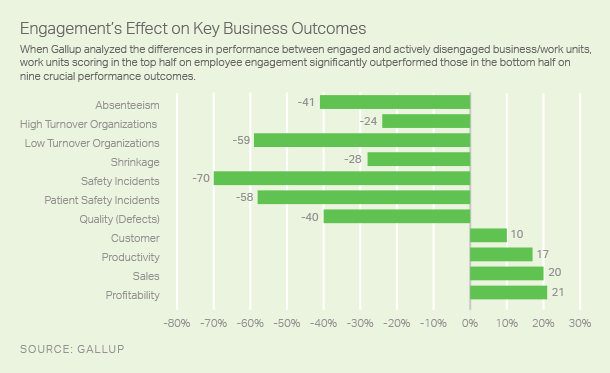A values-based culture can be achieved! It comes down to leadership and making the business case about the value of culture. Not only is managing culture the right thing to do for retaining and attracting employees, but it is also good for business.
Measurable Performance Outcomes
Today CEOs have more content available than ever before about the measurable performance outcomes resulting from efforts focused on culture.
- Data shows the impact of workplace culture on employee engagement and performance.
- Organizational culture plays a role in attracting and keeping the very best talent.
- These companies receive recognition as great places to work and also leverage their culture to create great customer experiences and brand loyalty.
Managing organizational culture is no longer considered “soft” or optional. Rather culture is a vital issue for CEOs and boards having the ability to create competitive advantage or disadvantage. The most recent case in point for culture as a competitive disadvantage is Wells Fargo, whose CEO fails to take responsibility for a culture that enabled unethical behavior for over five years. What price do you put on the value of your company’s reputation?
The Gallup organization has proven through extensive studies that…
“A highly engaged workforce means the difference between a company that outperforms its competitors and one that fails to grow.”
A healthy organizational culture of engaged employees results in lower; turnover, absenteeism, safety incidents; and higher customer satisfaction, quality, productivity, sales, and profitability. A summary of engagement’s effect on key business outcomes is shown in the Gallup chart below, Engagement’s Effect on Key Business Outcomes.
You can download a shortened nine page CEO Read book summary of Ann Rhoades’ best-selling book here. This will give senior leaders an overview of the Built on Values model described in Ann’s book Built on Values: creating an enviable culture that outperforms the competition, Jossey-Bass, 2011.
Additional Article by Ann Rhoades
In an article posted by Ann Rhoades on the Chief Executive site, How to Inspire Culture Change from the Top (March 22, 2011), Ann explains why a strong corporate culture must begin at the top. Leadership by example wins again. She says, “CEOs inspire great cultures…they cannot direct, drive or force a culture change…Culture cannot be dictated.” In the article she describes five principles for CEOs to follow to create and sustain a high performing culture:
- Draw on the expertise of A-Players.
- Give the gift of time.
- Tell stories, share the values.
- Do the small things right.
- Reward for values in the C-suite.
We welcome your comments below.




